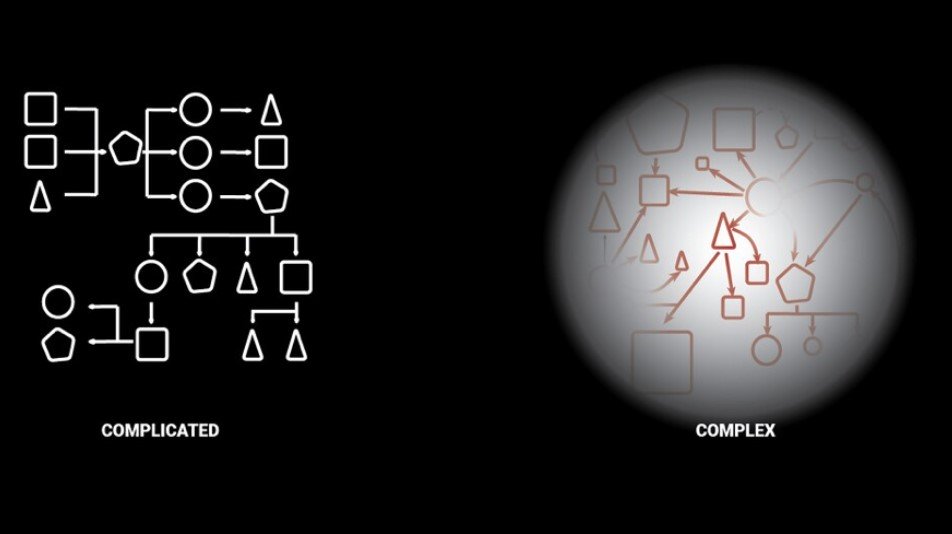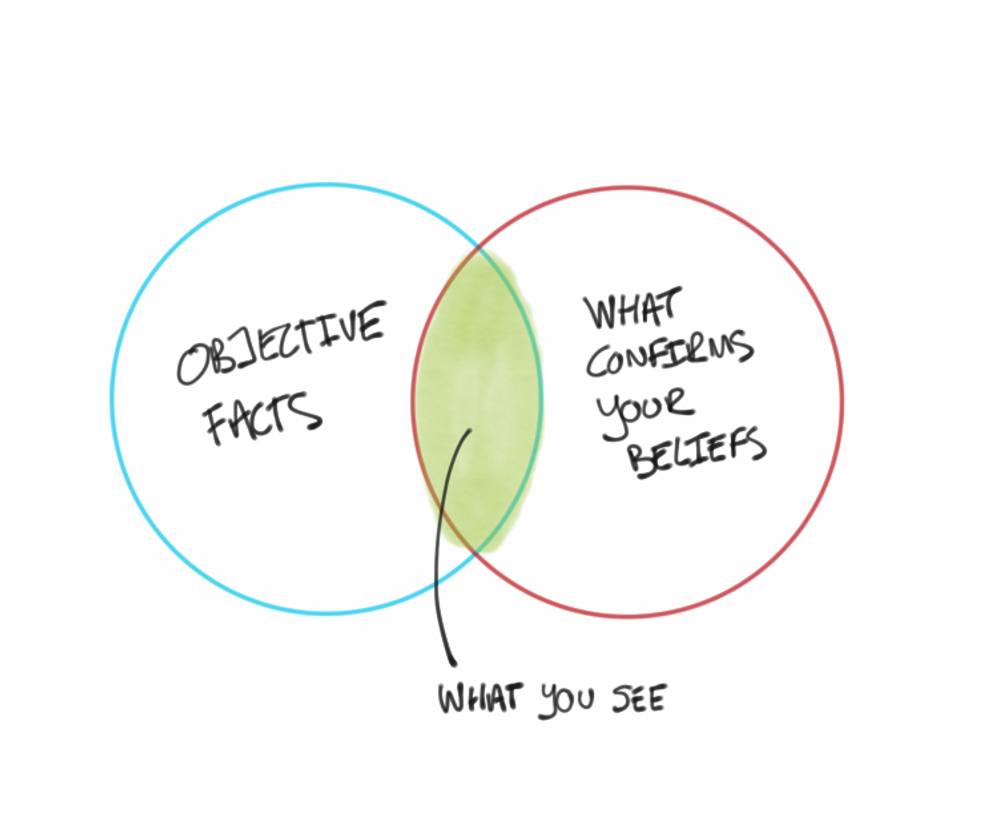Understanding Complex Systems Thinking
It's Not Complicated
Understanding, and being able to work with, complexity is an important thinking skill

What Are Complex Systems?
We are all working with complex systems, and we do so every day. The biggest one is life itself.
Much of the anxiety and frustration that we experience in our daily lives is the result of our approaching life with the wrong mindset.
We automatically lean towards a fairly mechanistic view of life that sees life as a complicated system. We do our best to understand the moving parts, and this in turns leads us to having expectations of how things will work out.
Inevitably our expectations are frequently unfulfilled and we get frustrated and anxious.
Of course, in all these situations, we understand that life is complicated.
However most of us, most of the time, make the mistake of thinking that if we do all that we can to understand how life works, and we try to address as many moving parts as possible, then we can achieve the outcomes that we seek.
We treat life as though it is a complicated system, whereas in reality life is a complex system, and so we set ourselves up for failure.
Complicated Systems - Sum Of The Parts This is classic Newtonian thinking - the mechanical universe which is all about: - Understand the part and you understand the system. - You can predict the outcome by knowing the starting conditions. Complex Systems - Greater than The Parts Complex Systems Thinking - is a holistic approach which focuses on the dynamics of the interactions between the multiple component parts of the system and is all about: - Understand the dynamics of the parts and you gain better understanding of the system. - You cannot predict the outcome by understanding the starting conditions, any number of outcomes may occur depending on the interactions of the elements in the system.
Example of a Complex System

A common example of a complex adaptive system is an ant colony.
Each individual ant has a decision role and each one also interacts with the other ants.
What emerges from their collective behavior is an ant colony.
If you look at the ant colony as a whole it seems to have all of the characteristics of an organism - it is adaptive, robust and well functioning and appears to have purpose. It has a life cycle.
But it is important to understand that each individual ant is working with local information and local interaction. Each individual ant has no sense of an overall global ant colony system, and ant colonies are solving very complicated and challenging problems with no leadership and no strategic plan.
Biology is full of many great examples of complex systems that adapt.
It is also important to understand that you can't understand the whole system by looking at the behavior of an individual ant.
This also applies to human behaviour.
Contrary to prevailing popular politicised thinking, the attitudes and behaviour of the individual are not representative of the whole group.
To be specific: the tragedy of George Floyd's death is not a metric of racism in US society or in the US police, or here in the UK, the behavior of royal assistant Lady Susan Hussey is not a metric of racism in the UK royal family.
Once you’re aware of how the structure of complex systems work, you’ll see these systems everywhere:
- Ecosystems: Interactions between species and the environment create unpredictable and adaptive dynamics.
- Financial Markets: Market behavior emerges from the interactions of countless investors, institutions, and external factors.
- The Human Brain: Billions of neurons interact in ways that produce consciousness, cognition, and behavior.
- Social Networks: Individuals' behaviors, relationships, and influences form emergent patterns like trends, opinions, and movements.
The basic features are consistent across all domains.
What Are The Dangers Of Misunderstanding Complexity?

In the late 18th Century the German government decided to modernise its forestry sector.
Applying the principle that greater profit margin existed if they could better see and measure their forestry stock, they transformed their forests with typical Germanic efficiency.
One of the major side effects of all this was the removal of all the foliage and underbrush from the forest floor.
The results, over the decades following these improvements, was a significant uplift in revenues and the German state looked on what it had created and decided that it was good... until the next generation of plantations came to fruition and the yield was appalling.
To cut a long story short they discovered that the removal of all the underbrush and associated detritus had deprived the soil of all its nutrients.
This example is useful because it illustrates what happens when well-intentioned outsiders look at a complex system, find it confusing, and think they can improve it.
"They come up with an idealized way that the system should work, and then use their power and authority to impose that simple, idealized vision on this complex reality.
In the short term, everything seems to get better as a result, they are widely praised, and then down the line catastrophe strikes and everything comes crashing down." [Taylor Pearson]
People seek to improve complex adaptive systems, sometimes with disastrous consequences. They may have the best of intentions. But there is no way they can anticipate the ultimate results.
What prevents us from dealing effectively with complexity? What gets in the way?
[1] Wrong Cause & Effect Explanations
Probably the single biggest factor that stops us dealing effectively with complex systems is our hardwired tendency to see cause and effect when there is none.
The human brain has evolved a wide range of modules which filter,
interpret, explain and interpret what's going on in the world around
us and all with the primary purpose of helping us to survive.
There is module in our brains that seeks explanations and establishes causality - or what it thinks is causality.
This module has been referred to as the interpreter, and it is constantly spinning stories and supplying causal explanations to the data it’s being fed; doing the best job it can with what it’s got to keep us alive and reproducing.
This may make you feel safe and in control, but it is so often wrong and it causes you to make sub-optimal decisions to which you are oblivious until you reap the consequences.
[2] Deference To Experts
We tend to listen to and be influenced by experts, despite the fact that expert predictions are frequently wrong.
Experts are authoritative, so we listen to them, even though we can sense that these people are predicting something that’s fundamentally hard to predict.
Experts are believable because they present themselves as authoritative.
It give us a sense of misplaced comfort and certainty to listen to them.
[3] Reluctance To Share Information
We are reluctant to share private information, so we aggregate information poorly.
We are susceptible to "shared information bias" which means that we feel far more comfortable sharing information that everyone else is already aware of.
This is partly to do with conformity and partly to do with what has been referred to as "cognitive burden".
When the situation is complex, and consequences are significant this creates a pressure because sharing unique [private] information puts the onus on the sharer to display competence, knowledge, and credibility.
How To Recognise Complex Systems

A system that displays the following characteristics is typically classified as complex, and understanding it requires a complex systems thinking approach.
Complex Systems - Characteristics
[1] Many Interacting Components
A complex system consists of many individual components (agents, nodes, entities) that interact with each other.
These interactions are often dynamic and nonlinear.
The behavior of each component is influenced by other components, often in unpredictable ways.
[2] Emergent Behavior
The system exhibits behaviors or patterns that emerge from the interactions of its components, and these behaviors cannot be predicted by looking at the components in isolation.
These emergent properties exist at a higher level than the individual components, such as flocking behavior in birds or traffic jams in road systems.
[3] Nonlinear Interactions
The relationship between cause and effect in complex systems is often nonlinear.
A small change in one part of the system can have a disproportionately large effect elsewhere.
Positive or negative feedback loops often amplify or dampen certain behaviors within the system, making it difficult to predict outcomes.
[4] Sensitivity to Initial Conditions
Complex systems are often highly sensitive to their initial conditions, meaning that very small differences at the start can lead to vastly different outcomes.
The system's evolution is dependent on its history, and certain sequences of events may lock the system into particular patterns or behaviors.
[5] Adaptation and Learning
Complex systems often exhibit self-organizing behavior, where components rearrange themselves without external guidance.
Components of the system may change or evolve in response to their environment, learning and adapting over time, as seen in ecosystems, economies, or the brain.
[6] Distributed Control
In a complex system, no single entity or component has full control over the system’s behavior.
Control is distributed across various components that influence each other.
Agents or components make decisions based on local information, which collectively leads to global behaviors.
[7] Unpredictability and Uncertainty
Due to the system's inherent complexity, it is challenging to predict its future states or behavior with accuracy.
Complex systems often exhibit chaotic behavior, where long-term prediction is nearly impossible.
Instead of deterministic outcomes, the system may be better understood through probabilities and scenarios.
What Is The Difference Between Complex Systems And Complicated Systems?

Many people believe that complexity is just higher order of complicated, and that there is a continuum with the difference being one of degree, not type.
But the reality is that they are fundamentally different types of systems.
As long as you think that you are dealing with complicated systems, you will wrongly assume that you are able to control outcomes and find solutions to problems and in the process waste a lot of your time and money.
Here’s a breakdown of the key differences between complex systems and complicated systems:
How To Differentiate between a Complex System and a Complicated System?
[1] Nature of Interactions
Complicated System
In a complicated system, the parts interact in a predictable and organized way.
Each component’s role is well-defined, and the interactions follow established rules.
The system’s overall behavior can be understood by breaking it down into its components.
Example - An airplane is a complicated system. It consists of many parts (engines, electronics, wings), but each part has a specific, well-understood function, and when assembled correctly, the airplane works predictably.
Complex System
In a complex system, the interactions between components are often unpredictable and can vary over time.
The behavior of the system as a whole emerges from these interactions, and the individual components may adapt or change based on feedback from the system.
Example - A traffic system is complex. The behavior of individual drivers (agents) interacts with others in unpredictable ways, leading to emergent phenomena like traffic jams, which cannot be easily predicted by looking at individual cars alone.
[2] Predictability and Understanding
Complicated System
A complicated system can be understood through analysis.
Although it might involve many parts, if you study the system deeply, you can predict its behavior.
Solving problems in complicated systems usually involves breaking them down into smaller parts and solving each part systematically.
Example - A computer is complicated, but once you know how the circuits and software interact, you can predict exactly how it will behave when you input data.
Complex System
A complex system is inherently less predictable.
Even if you understand the parts, their interactions may produce unexpected or emergent outcomes.
Studying individual components doesn’t give a full picture of the system’s behavior, and long-term predictions are often uncertain.
Example - An ecosystem or a financial market is complex because small changes (like a new species or economic event) can have disproportionately large and unpredictable effects.
[3] Emergent Properties
Complicated System
A complicated system doesn’t usually exhibit emergent properties.
The whole system can be understood by analyzing the sum of its parts.
The behavior of the system is largely the result of the proper functioning of each component.
Example - A clock is complicated but not complex. It functions based on the sum of its parts, with no surprising or emergent behaviors.
Complex System
Complex systems exhibit emergent behavior, where the whole system displays characteristics that cannot be explained by the individual parts alone.
These behaviors emerge from the interactions of components, often in unpredictable ways.
Example - A colony of ants (complex system) exhibits emergent behaviors like foraging patterns or nest building, none of which can be understood by examining a single ant in isolation.
[4] Decentralisation vs. Centralisation
Complicated System
Complicated systems often have centralized control or coordination, where a specific entity or blueprint governs how the system works.
Example - A factory assembly line (complicated system) is designed to work in a specific sequence, with each machine or worker performing a well-defined task in a coordinated way.
Complex System
Complex systems often involve decentralized or distributed control.
The system doesn’t have a single controlling entity; instead, behaviour arises from the interactions and decisions of many independent agents.
Example - The internet (complex system) is decentralized, with countless independent nodes interacting with each other without a single point of control.
[5] Ability to Engineer or Design
Complicated System
Complicated systems can be designed and engineered.
Their components can be carefully specified, assembled, and tested to work together in a predictable way.
Example - A space shuttle is extremely complicated, with thousands of parts engineered to work in harmony.
Complex System
Complex systems generally cannot be engineered or fully controlled in the same way.
You can influence the system’s behavior, but you cannot design every part of it or predict all the outcomes.
Example - An urban city (complex system) cannot be fully designed; it grows and evolves based on human behavior, economic trends, and social interactions that are impossible to fully predict or control.
[6] Adaptability
Complicated System
Complicated systems are usually static in their structure.
Once assembled or built, they function according to their design without adapting or learning over time.
Example - A bridge is complicated but not adaptive. It works according to a fixed design, and it doesn’t change how it functions over time.
Complex System
Complex systems are adaptive and can change based on interactions and feedback.
The individual components may learn, evolve, or change in response to their environment.
Example - A stock market adapts constantly based on new information, the actions of traders, and economic trends.
Its behavior evolves as participants adjust their strategies.
[7] Problem-Solving Approach
Complicated System
Problems in complicated systems are usually solved by experts with specialized knowledge.
Solutions often require thorough analysis and technical understanding.
Example - Fixing a car engine requires knowledge of how all the parts interact and how to repair or replace specific components.
Complex System
Problems in complex systems often require experimental, iterative, or adaptive approaches.
Solutions emerge from testing, learning, and feedback loops rather than pre-defined plans.
Example - In managing an ecosystem or a healthcare system, you often try interventions, observe how the system responds, and then adjust your approach accordingly.
Tips For Dealing With Complex Systems

Tangible vs Intangible Factors, Control vs Influence
We naturally gravitate to the tangible factors, the things and that we see easily and control.
Complex systems thinking requires us to shift our focus onto the intangible factors and things that we can influence.
Identifying The Intangibles
Based on my experience, here are 8 areas to explore:
Personal Observations On Working With Complex Systems
By nature I am someone who likes to be in control of situations and to understand how things work. But I am finding that over the years I have been slowly adopting a complex systems approach to life in general and my business in particular.
Based on these experiences, here is a brief summary of areas that I find it very useful to focus on. Some of these are subjects that I have already covered in other articles and for brevity I have linked to them and you can follow through with further reading if this is of interest to you.
- Approaching situations with a beginners mind that is aligned with reality This is not easy, but is a discipline worth applying.
- Focusing on the intangibles.
- Moving away from control and towards influence.
- Looking for patterns and trying to make sense of, and understanding, the dynamics of the complex system.
- Paying close attention to organisational culture the invisible software that determines individual and group behaviour.
- Talking with and listening to those at the front line who are directly involved and can tell you so much more about what's really going on.
- Looking for co-creative, group based solutions.
- Identifying hidden value with large upside.
- Embracing anomalies
- Looking out for inflection points
- Applying probabilistic thinking
Further Reading :
How to Get What You Value by Changing What You Measure
Inflection Points - Reaching Critical Mass And The Tipping Point
Why You Should Embrace Anomalies – The Value Of Disconfirming Evidence
How To Benefit From The Unseen Margins - 5 Key Tips For Success
Are You Aligned With Reality? Or Do You See What You Believe?
Next Article:
Stay On The Bus - When To Keep On Going
Return from: "Complex Systems" to: Walking The Talk
LATEST ARTICLES
Understanding Complex Systems Thinking - It's Not Complicated
 Understanding, and being able to work with, complexity is an important thinking skill.
We are all working with complex systems, and we do so every day. The biggest one is life itself. We automaticall…
Understanding, and being able to work with, complexity is an important thinking skill.
We are all working with complex systems, and we do so every day. The biggest one is life itself. We automaticall…Stay On The Bus - When To Keep On Going
 The Helsinki Bus Station Theory
Have you ever started a new project, initiative or role with a big vision and a determination to make a difference? Initially you were full of enthusiasm and highly mo…
The Helsinki Bus Station Theory
Have you ever started a new project, initiative or role with a big vision and a determination to make a difference? Initially you were full of enthusiasm and highly mo…Zen Thoughts Email Series
 Conversations With A Friend Zen Thoughts is an email series of 50 short messages spread over 3 months. The messages are written in the style of a conversation with a friend who is going through a toug…
Conversations With A Friend Zen Thoughts is an email series of 50 short messages spread over 3 months. The messages are written in the style of a conversation with a friend who is going through a toug…How to Get What You Value by Changing What You Measure
 Give Up Control & Gain Influence To Get What You Want
The metrics we choose to focus on can significantly shape our outcomes, sometimes in ways we don't intend. The challenge is to make sure that you…
Give Up Control & Gain Influence To Get What You Want
The metrics we choose to focus on can significantly shape our outcomes, sometimes in ways we don't intend. The challenge is to make sure that you…How to Become A Master At Overcoming Hard Moments
 "The best in the world are not the best because they win every point. It's because they lose again and again and have learned how to deal with it." This quote from Roger Federer has got a lot of cover…
"The best in the world are not the best because they win every point. It's because they lose again and again and have learned how to deal with it." This quote from Roger Federer has got a lot of cover…Drop The Story - Deal With Your Demons and Transform Your Experience
 Are you living your life from the stories you tell yourself? Learning how to drop the story and deal with that voice in your head can be a game changer. When you can do this you will have a powerful t…
Are you living your life from the stories you tell yourself? Learning how to drop the story and deal with that voice in your head can be a game changer. When you can do this you will have a powerful t…Standing In The Gap Between No Longer And Not Yet
 Standing In The Gap In Conditions Of Imposed Change. This is about imposed change and surviving a dire and desperate situation where you are stuck in a difficult or seemingly impossible set of circums…
Standing In The Gap In Conditions Of Imposed Change. This is about imposed change and surviving a dire and desperate situation where you are stuck in a difficult or seemingly impossible set of circums…Preparing The Ground - For Things You Can Not See
 We plough the fields and scatter the good seed on the ground. The phrase "preparing the ground" is a metaphor for making the necessary preparations to create the favourable conditions for something to…
We plough the fields and scatter the good seed on the ground. The phrase "preparing the ground" is a metaphor for making the necessary preparations to create the favourable conditions for something to…Easing The Weight Of Expectation
 Don’t you often feel like you are carrying the weight of the world on your back? Our start point is understanding that the ego has a very clear idea of how things ought to be, and its intention and ex…
Don’t you often feel like you are carrying the weight of the world on your back? Our start point is understanding that the ego has a very clear idea of how things ought to be, and its intention and ex…Coram Deo - Living In Consciousness
 In you there is a dimension of consciousness far deeper than thought. It is the very essence of who you are. Coram Deo is about living in consciousness. It is a Latin phrase which literally means “to…
In you there is a dimension of consciousness far deeper than thought. It is the very essence of who you are. Coram Deo is about living in consciousness. It is a Latin phrase which literally means “to…The Power Of Patience - Why You Need The World's Toughest Quality
 Nothing in the world can take the place of patience. Patience and persistence are omnipotent. In everyday life, patience is often overshadowed by the desire for immediate results. We live in an era of…
Nothing in the world can take the place of patience. Patience and persistence are omnipotent. In everyday life, patience is often overshadowed by the desire for immediate results. We live in an era of…Demonizing The Other and Personal Acts Of Compassion
 What Does Demonizing The Other Mean? Demonizing the other refers to the act of portraying a group of people or an individual as inherently evil, threatening, or inferior. It often serves to justify di…
What Does Demonizing The Other Mean? Demonizing the other refers to the act of portraying a group of people or an individual as inherently evil, threatening, or inferior. It often serves to justify di…Why You Should Embrace Anomalies - The Incredible Value Of Disconfirming Evidence
 Is Your Desire To Be Right Greater Than Your Desire To Have Been Right? An anomaly is a deviation from what is expected or commonly regarded as the norm. It often appears as an unexpected observation…
Is Your Desire To Be Right Greater Than Your Desire To Have Been Right? An anomaly is a deviation from what is expected or commonly regarded as the norm. It often appears as an unexpected observation…Amazing Grace - The Majesty And The Mercy of Freedom From Your Pain
 "I once was lost, but now I am found, was blind, but now I see." The hymn and popular song "Amazing Grace" was written 250 years ago by John Newton, a former slave trader who in 1748 nearly died in a…
"I once was lost, but now I am found, was blind, but now I see." The hymn and popular song "Amazing Grace" was written 250 years ago by John Newton, a former slave trader who in 1748 nearly died in a…The Transformative Power Of Acceptance
 Experience The Power Of Acceptance. This website contains about one million words. You could read every single word and it wouldn't make any real difference to you. You might become better informed, b…
Experience The Power Of Acceptance. This website contains about one million words. You could read every single word and it wouldn't make any real difference to you. You might become better informed, b…
